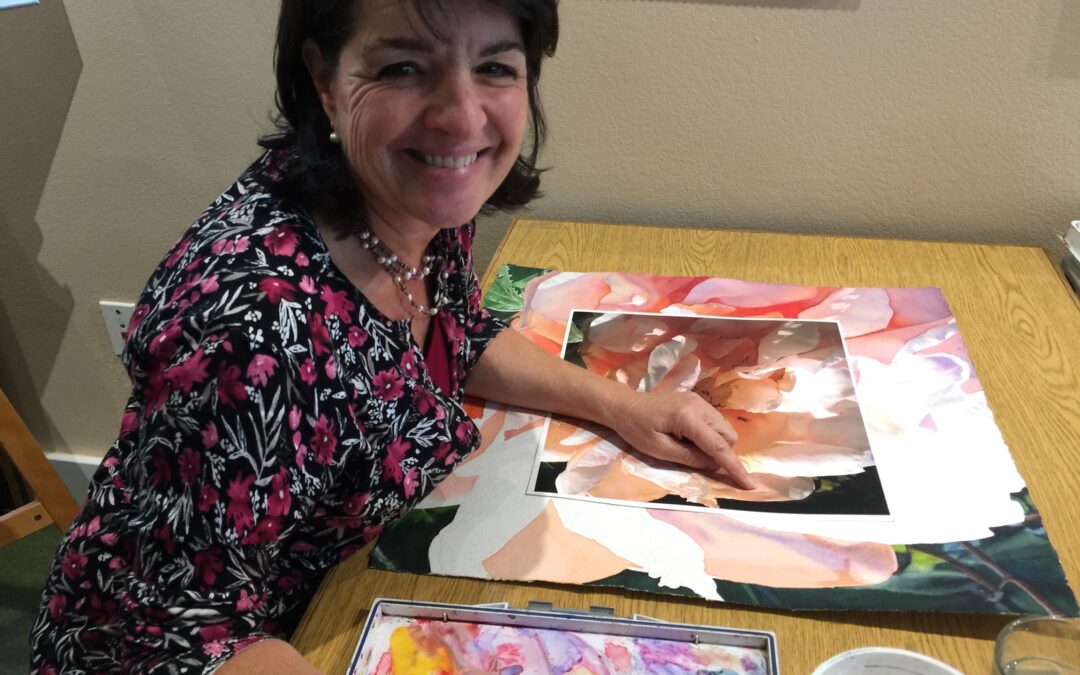
by Betsy Fasbinder | May 1, 2024 | Podcasts
Cara Brown is an award-winning watercolor artist and teacher, though she came about this having this be her life quite unexpectedly. When she was 24, her first husband proposed marriage to her – in front of a group of friends. She didn’t say yes or no, she said “I want kids.” She had always yearned for the whole experience available to people in female bodies – becoming a mother, including being pregnant and giving birth.
When life circumstances deemed that not possible, she went into a dark time, wondering how her life could be fulfilling, how it could have meaning, given this crushing disappointment. She prayed for the energy to pursue adoption – or to be given something else.
Within a few years, it became obvious what that something else would be. She was asked by a friend to show her art for the first time in 2007. In 2011 she led her first groups of watercolor student-artists. In the years since, these two aspects of her life have evolved, grown, and flourished. She almost stumbled upon a rich and fulfilling life of art making and providing instruction and the supportive environments in which people best expand and learn. Living a Life in Full Color is Cara’s mission, for herself and all of us.
You can find out more about Carta and see her art at: LifeInFullColor.com and find her podcast about art and life, Watercolor Conversations wherever you find your favorite podcasts.
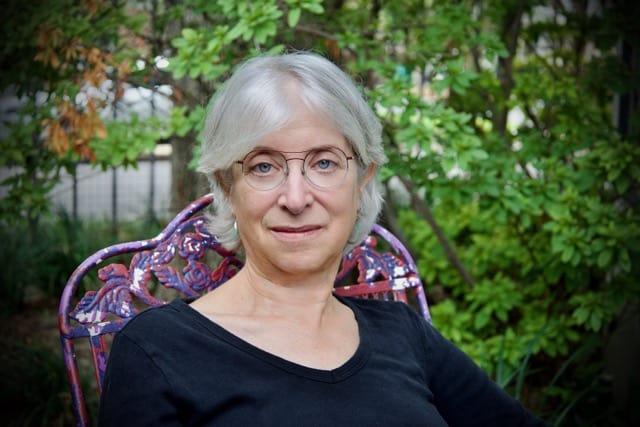
by Betsy Fasbinder | Apr 3, 2024 | Podcasts
When Leah Lax was asked to write a libretto for an opera intended to celebrate local immigrants, she began by spending a year listening to the stories of upheaval, migration, and arrival, told to her in confidence by people from around the globe. She felt she had discovered the song of America, found its great beating heart. But Leah also discovered troubling truths about America, through the eyes of immigrants, and in so doing was inspired to uncover the lost history of her own Jewish family. Through this interwoven experience of their story and hers, Leah found not only a larger context for the story of immigrants, but a new way of looking at how her own identity, rather than as a member of a small “minority”, but as a part of a very large majority who are here in this country because either they or their parents immigrated from another country. Nearly two decades after Leah had those conversations, long after the opera she wrote had left the stage, she captured those stories into this “libretto” of a story, her extraordinary new book, Not From Here: The Song of America.
Leah was a guest on The Morning Glory Project after her deeply stirring memoir, Uncovered: How I Left Hasidic Life and Finally Came Home, which was the first gay memoir ever to come out of the Jewish ultra-Orthodox world. Leah’s dual career as an author and as a librettist has brought her many well-deserved accolades. When she’s not writing, you can find her playing cello or kayaking around the world with her wife.
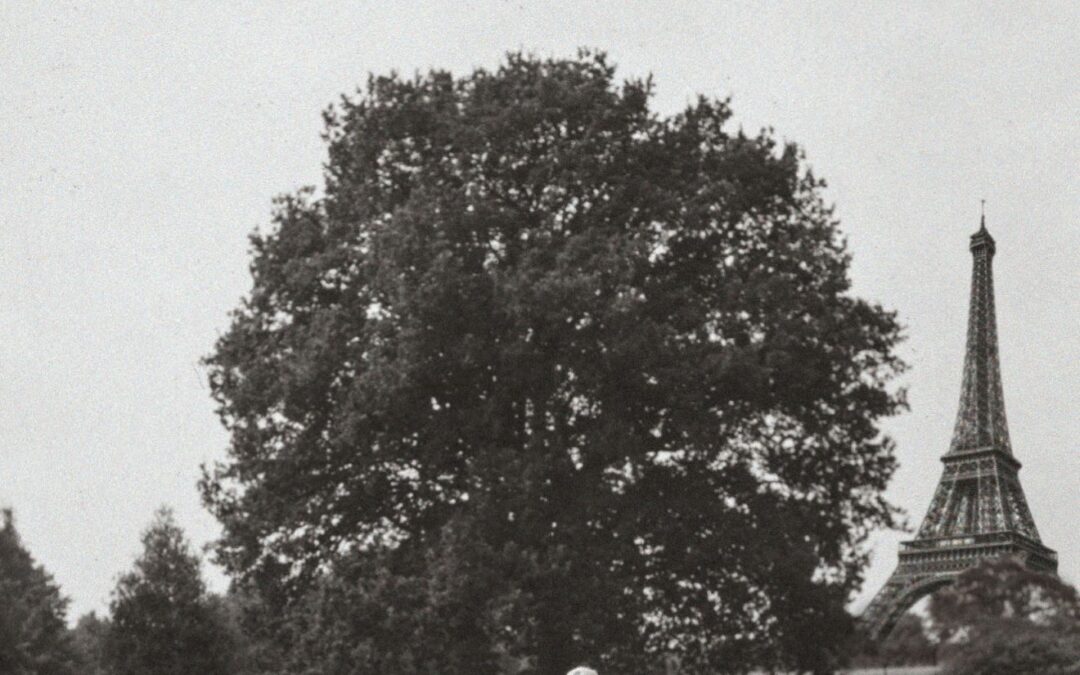
by Betsy Fasbinder | Mar 6, 2024 | Podcasts
Growing up as a girl in the 1950’s girls were not expected to have any career goals. They were
going to be housewives. Susanna Solomon’s mother complained bitterly about her lot in life. Her father told her she was too stupid to go to college, then he fell in love with someone else—someone other than Susanna’s mother. When her mother took her own life when Susanna was fourteen, the upheaval in the family was seismic.
At 20 she met a guy who was loving and warm and wonderful. At first he was great fun, but
he liked to drink. Each year went by things became more difficult, as he would yell and stagger, and diminish Susanna and their two children. After 11 years, Susanna made the decision to get a divorce, but she knew she didn’t have enough skills to support herself and her kids on her own and that “women’s jobs” of that era wouldn’t provide enough.
She decided that she would need what was then called a “man’s” career, with a “man’s income”. Everyone she knew, but for her brother, made fun of her for what seemed like an absurd choice. After six-and-a-half years, she graduated Summa Cum Laude, got a job and ended her marriage, becoming a single parent.
In her delightful short story collections, Point Reyes Sheriff’s Calls, and More Point Reyes Sheriff’s Calls, Susanna takes the tidbits of sheriff’s call incidents published in her local small-town paper and imagines what the late Paul Harvey might have called “the rest of the story”. In her more recent publication, Paris Beckons, she continues to do what she’s always done… breaking from the expected, weaving her lived experiences and fictional storytelling throughout a collection of short stories that put a different light on loss, memory, and independence.
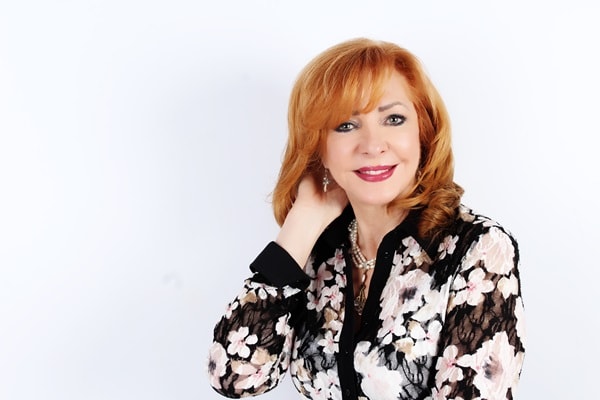
by Betsy Fasbinder | Feb 7, 2024 | Podcasts
Kathryn Abdul-Baki was born in Washington, DC, to an Arab father and an American mother. In addition to her bi-cultural immediate family, she had a globetrotting childhood, growing up with dramatic changes in community and culture as her father’s work brought them to Iran, Kuwait, Beirut, and Jerusalem.
The geographical and cultural changes were huge, but dwarfed in comparison to the tragic losses her family would sustain. When she was 7, Kathryn’s brother was born and would be struggle with a heart defect that required extensive treatment. During this time, her mother was diagnosed with cancer. Her brother died at the age of 18-month. Her mother at age 32, and Kathryn’s whole world changed.
Kathryn, despite a happy marriage and beloved children of her own, would find herself in the throes of depression as she came to her own thirtieth birthday. With what were then inexplicable feelings of abandonment, she’d make an attempt to take her own life. Behind the scrim of her own life, there would always be the image of the mother she lost before she ever got to really know her.
It was by reconnecting to the joyful aspects of her early life that Kathryn was able to heal, and specifically through dancing that she’d reconnect to this joy. Her memoir, Dancing Into the Light gives readers a unique glimpse into her story, into Arab culture, and into the psyche of a young Arab woman.
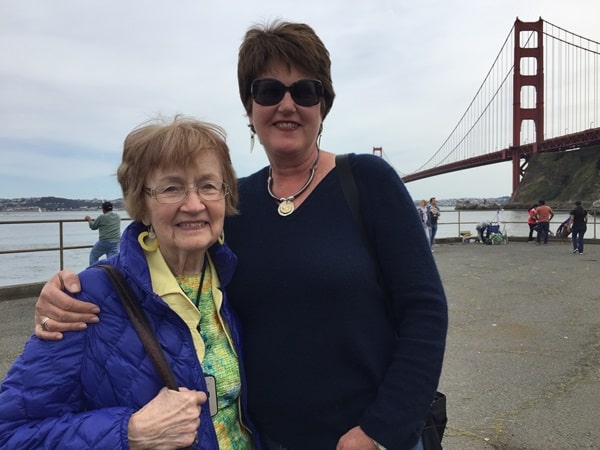
by Betsy Fasbinder | Jan 10, 2024 | Podcasts
Donna Stoneham and her mother found a special closeness in the end of Mary Ruth’s life. Theirs had been a relationship fraught with challenge throughout most of their shared lifetime but in her mother’s final years, the two found healing and deep connection. When Mary Ruth passed, Donna was launched into a new kind of transformational grief journey in which the conversation with her mother did not end with her passing at age 88. Catch Me When I Fall is a moving collection of poems and letters through which Donna keeps her heart open to the mystery and power of transcendent, eternal love that lives on beyond the human lifetime.
Donna’s lifelong experience as a poet accustomed to seeking meaning, her professional experience as an executive coach, and her history as a hospice chaplain inform her rich and deep exploration of connection with her mom as a part of not only grieving death, but embracing life. A balm for a grieving heart, Catch Me When I Fall is an inspiration for anyone who has lost someone they love. Part love song, part grief map, this collection offers another way to look at loss and a thousand ways to embrace life.
Donna is also the author of The Thrivers Edge: Seven Keys to Transform the Way You Live, Love, and Lead.




